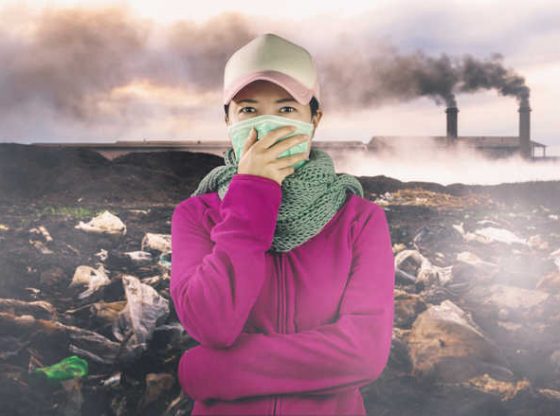
Dr Rinky Kapoor
As air quality index (AQI) levels fluctuate between severe and dangerous, there is no escaping air pollution and its multitude harmful effects on various organs of the body, including the largest organ — our skin. Air pollution makes it difficult for the skin to breathe, leaves it parched, and robs it of essential ingredients.
The skin is our only barrier against external elements. The skin is exposed to ultraviolet radiation, smoke, exhaust fumes, etc. containing volatile organic compounds and aromatic hydrocarbons and ozone. The skin acts as a shield against such chemicals and physical air pollutants. However, if you do not protect your skin then exposure to air pollutant can lead to various problems such as:
- Premature ageing
- Brown spots
- Uneven skin tone
- Dehydration
- Acne
- Atopic dermatitis
- Psoriasis
- Eczema
- Rosacea
- Skin cancer
Interaction between various air pollutants affects the skin in different ways. For example, pollutants like nitrogen dioxide and sulphur dioxide scatter the UVR and UV irradiance but these are the active ingredients in smog, which cause damage to the skin. The effects of pollution depend on various factors such as the nature of pollutants that the skin is exposed to and the texture of the skin. The protective ability of the skin is not unlimited and continuous exposure to environmental factors diminishes the skins defence potential. As a result, the skin loses its ability to produce natural antioxidants.
However, some preventive measures can protect the skin against air pollution and repair the damage done, at least to some extent. The pollution particles in air are large and cannot penetrate the skin but the chemicals that are attached to these can penetrate it and even alter the genetic structure of the body. Some simple measures can help protect skin from damage and restore to its elasticity:
Hydrate: Drink lots of water daily to keep the skin hydrated from inside. Hydration improves the elasticity of skin and enhances its natural protective quality. It also flushes out the toxins.
Scrub daily: If remain outdoors for long periods of time then you must scrub your face and exposed parts of the skin daily. Scrub for 10 seconds every day, this will help your skin recover from the damages of the pollutions.
Double cleanse skin every night: Do not go to bed without cleansing your skin. First use a cleaning wipe or lotion or light oil to remove all traces of make-up, dirt and grime from the skin. Next, wash your face with a cleanser to remove any traces of pollutants on the skin. You can also use a cleansing brush for better cleansing.
Layer skin with protectants: Layer your skin with toner, moisturiser and sunscreen before you step out. Toner, moisturiser and sunscreen should be applied at least 40 minutes before stepping out. Then re-apply the sunscreen every 2 to 3 hours.
Use face packs: Use face packs that have antioxidants as their ingredients. Face packs help remove radicals and replenish and nourish the skin. Use homemade packs that include natural ingredients like turmeric, gram flour, milk, lemon juice, etc.
Massage: Massage your skin with coconut oil once a week and bathe with warm water after the massage. A coconut oil massage will help relax the skin and cleanse it.
Protect skin and eyes from blue-light exposure: Our digital devices emit constant blue light. A continuous or prolonged exposure to this light can be dangerous for the eyes as well as the skin. Set your devices to yellow light to reduce the strain.
Eat more Vitamin B3: Vitamin B3 is one of the best-known ingredients to fight against negative effects of dust, exhaust fumes and cigarette smoke. Vitamin B3 reduces the damage to skin cells, strengthens the skin barrier, and repairs the UV damage.
Avoid polluted areas. If you have to be in areas with polluted air, then invest in high quality air masks to protect your skin. Start using air purifiers and ventilators at home.
Right skin-care products
You can shield your skin from airborne pollutants and their effects by using the right skin-care products. Look for antipollution ingredients that contain antioxidants
and soothing ingredients that can neutralise the damage caused by pollution as well as replenish the lost essential elements on the skin’s surface. If you notice environmental damage to your skin, consult a dermatologist for the correct treatment options best suited to your skin type.
[“source=tribuneindia”]
